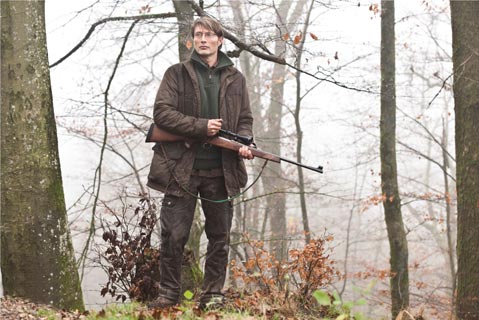Review: The Hunt
Mads Mikkelsen stars in a film written by Tobias Lindholm and Thomas Vinterberg, and directed by Vinterberg.

Along with the expected procession of superficial entertainments and blockbusters, blockheaded and otherwise, Santa Barbara’s cinema summer has also been marked by artistic salvation by way of Denmark. Two exceptional Danish films, the unusually subtle thriller The Hijacking and the unusually subtle drama The Hunt, are vastly different in many ways, the former being an international incident at sea versus company boardroom gamesmanship, and the latter a study of the fragile circumstances in a kindergarten where an atmosphere of sexual accusations and witch hunting disrupt the provincial quiet. What links the two films is a potent and poetic sense of restraint, an avoidance of the usual cinematic clichés, and a delicate balance of elements in the storytelling and the visual scheming.
The Hunt, Thomas Vinterberg’s quietly staggeringly new film, is in some ways the opposite of his infamously most famous film, The Celebration, one of the greatest creations in the naturalism-centric Dogme 95 school of Danish cinema. Whereas The Celebration focuses, with a chilling incisiveness, on a family gathering where a patriarch’s incestuous misdeeds are aired in public, The Hunt deals with the collective dread, hysteria, and communal ostracism stemming from a little girl’s misunderstood accusation of sexual abuse.
As the unjustly accused kindergarten teacher, whose life threatens to be unraveled by the guilty-until-proved-innocent situation he suddenly finds himself in, Mads Mikkelsen delivers a performance that embodies understatement, a rarely seen attribute on the big screen. Apart from a cathartic outburst, for the most part, he remains stoic and proudly fixed on the high road as the village turns against him, as his existence turns claustrophobically dark amid the Christmastime festivities all around him.
As with The Deer Hunter, The Hunt draws on the hunting aspect of its story in both literal and metaphorical ways. A scene in which a majestic stag is felled, killed by our sharp-shooting protagonist, becomes a motif in a narrative about the relative helplessness of a guiltless victim in the crosshairs. A later hunting scene adds a chilling post-script suggestion about lingering angst.
The Hunt functions in dual ways. It is a specific and emotionally engaging, dramatic tale. It is also a more general study of the perils of viral groupthink and mass hysteria — in a Danish village, or more broadly, in a country, a religion, or other collective body where rationality can be imperiled by dangerous assumptions smugly accepted by the majority.



